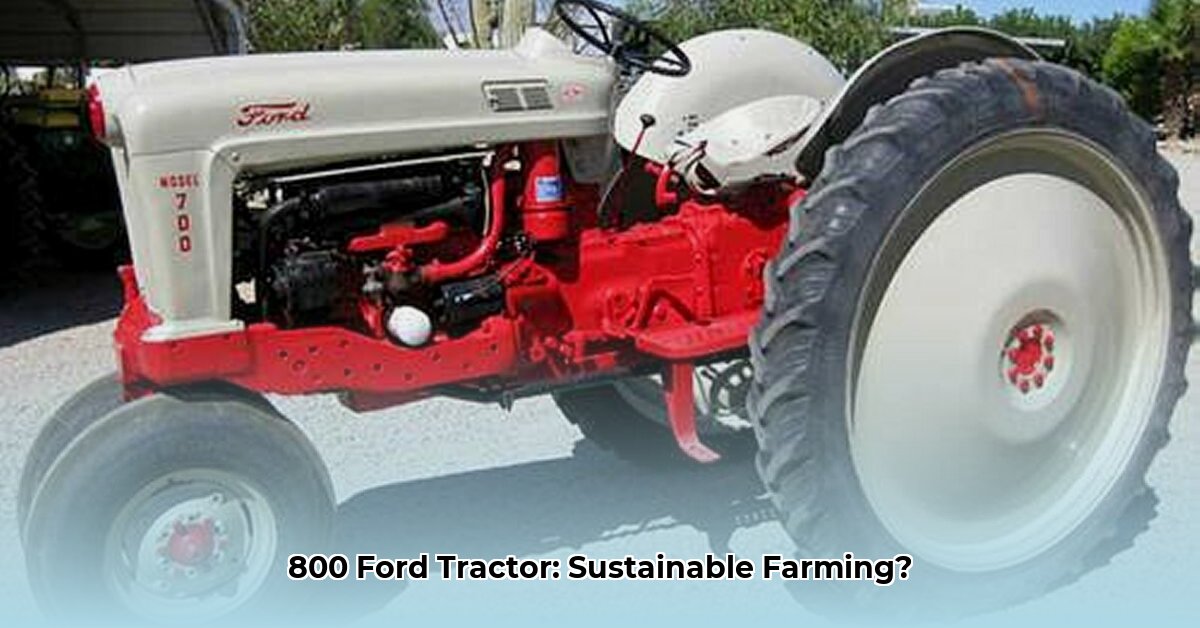
800 Ford Tractor: A Sustainability Assessment for Modern Farming
The Ford 800 tractor, a stalwart of agricultural history, demands a reevaluation in the context of modern, sustainable farming practices. While its robust build and longevity are undeniable assets, its fuel efficiency, technological limitations, and environmental impact require careful consideration. This guide examines the Ford 800's sustainability profile, offering insights for farmers, equipment dealers, and policymakers. For more information on Ford tractor parts, see this helpful resource.
The Ford 800: Durable, But Environmentally Sustainable?
The Ford 800's reputation for durability is well-earned. Many remain operational today, a testament to their robust construction. This longevity initially translates to cost savings. However, modern sustainable agriculture necessitates a broader assessment beyond initial investment. Factors like fuel consumption and emissions must be weighed against purchase price and operational lifespan. How can we reconcile the tractor's historical value with environmental responsibility?
Fuel Economy and Emissions: A Critical Analysis
Precise fuel consumption data for the Ford 800 is scarce. Nevertheless, compared to modern tractors, its fuel economy is substantially lower. This translates directly to heightened operational costs and a larger carbon footprint. This is a key challenge when striving for sustainable practices. Isn't minimizing fuel consumption a fundamental element of environmentally conscious farming?
Technological Limitations: Bridging the Gap to Precision Agriculture
The Ford 800 lacks the technological advancements crucial for modern, sustainable agriculture. GPS guidance, precision fertilizer application, and data-driven decision-making tools are no longer luxuries; they are necessities for optimizing resource use and minimizing waste. Can a farm truly thrive without the technological sophistication of precision agriculture?
Retrofitting the Ford 800: Challenges and Opportunities
Retrofitting a Ford 800 for improved fuel efficiency and reduced emissions presents significant challenges. While modifications are possible (like installing electronic ignition), the cost-benefit ratio often favors replacing the tractor with a modern, fuel-efficient alternative. What are the realistic limitations of retrofitting versus total replacement when it comes to both cost and environmental impact?
Actionable Steps Towards Sustainable Farming
The decision regarding the Ford 800 reflects a broader commitment to sustainable farming. The following steps provide a roadmap for this transition:
For Farmers:
- Comprehensive Farm Assessment: Analyze your farming operations. Identify tasks where a modern tractor offers improved efficiency and sustainability.
- Explore Available Options: Research fuel-efficient, technologically advanced tractors, investigating potential government subsidies and incentive programs.
- Strategic Equipment Replacement: Consider a phased approach to equipment upgrades, prioritizing tasks that benefit most from technological advancements.
For Equipment Dealers:
- Support for Transition: Continue providing parts and service for older models while actively promoting and supporting the adoption of more sustainable equipment.
- Invest in Staff Knowledge: Ensure sales and service teams are well-versed in current technologies and sustainable farming best practices.
For Policymakers:
- Incentivize Equipment Upgrades: Implement financial assistance, such as trade-in programs and subsidies, to encourage adoption of sustainable technologies.
- Strengthening Environmental Regulations: Develop and enforce stricter emission standards for agricultural equipment, while simultaneously supporting research and development of innovative sustainable technologies.
Assessing the Risks of Continued Ford 800 Use
Continuing to operate a Ford 800 presents several risks:
| Factor | Risk Level | Mitigation |
|---|---|---|
| Tractor Operation | Medium | Regular maintenance, operator training, adherence to safety protocols |
| Continued Older Tractor Use | High | Gradual replacement with fuel-efficient, low-emission alternatives |
| Unsuccessful Retrofit Attempts | Medium to High | Thorough cost-benefit analysis, environmental impact assessment |
Navigating Regulations: Compliance and Best Practices
Farmers must comply with all local, state, and federal regulations concerning emissions, fuel types, and safety when operating agricultural machinery. Staying informed about these regulations is crucial.
The Ford 800 represents a vital piece of agricultural history. However, the future of sustainable farming requires a transition towards more efficient and environmentally responsible practices. The decision to upgrade isn't solely about replacing a machine; it's about securing the long-term health and profitability of your farm and contributing to a more sustainable agricultural future.